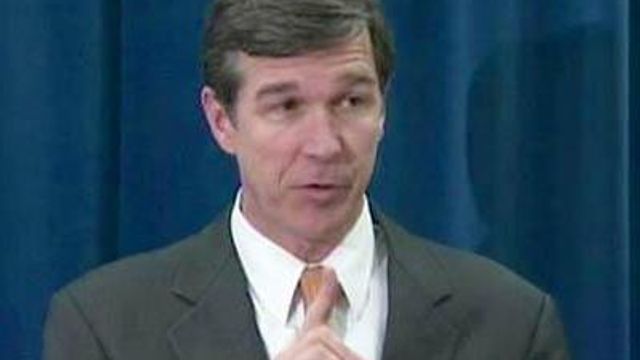Seven station owners subpoenaed over gas-price spike
The subpoenas are to stations that reportedly sold gas for more than $5.49 a gallon. A second wave of subpoenas is expected to be issued later in the week.
Posted — UpdatedGas prices jumped Friday amid fears that Ike would cripple U.S. refining capacity along the Texas Gulf Coast, which processes about one-quarter of the nation's daily fuel needs. The fears prompted long gas lines at area gas stations as people scrambled to fill their tanks and searched for the lowest possible prices.
The average price for a gallon of unleaded regular in North Carolina was $4.085 Monday, topping the previous record of $4.048 in July, according to AAA Carolinas. In the Triangle, the average price was $4.05 Monday, equaling the previous high.
Last Thursday, the average gas price statewide was $3.67 a gallon. In the Triangle, the average was $3.68.
Prices at some stations had shot up more than $1 a gallon overnight. A Crown station on South Saunders Street in Raleigh, for example, charged $4.79 a gallon on Friday while a BP station down the street charged $3.51.
By Monday, the price at the Crown station dropped back to $3.89 a gallon, while the BP station's prices rose to $3.95.
The owner of the Crown station declined to comment on the spike in his station's prices.
More than 2,800 people have called the Attorney General's Office in the past three days, complaining about rapidly rising prices, Cooper said.
The seven subpoenas are to the owners of 14 stations that reportedly sold gas for more than $5.49 a gallon on Friday or Saturday. The stations are located in Anson, Ashe, Cherokee, Guilford, Montgomery, Stanly and Transylvania counties.
The stations have until Sept. 26 to respond to the subpoenas.
A second wave of subpoenas would be issued to stations later in the week, Cooper said. Investigators also could look at the prices that wholesalers and distributors charged, he said.
"Gouging for greed will not be tolerated in North Carolina," he said, putting gasoline suppliers on notice. "Think twice before setting unreasonably excessive prices in order to take advantage of people who are already paying the price at the pump."
Companies face a civil penalty of up to $5,000 for each violation of the price-gouging law.
High gas prices don't necessarily equate to price-gouging, Cooper said. The station could be charged high prices by its wholesalers. The wholesale price of Gulf Coast gas rose to $4.85 Friday.
"It's clear that this hurricane has caused some market instability and that there has been some rise in (gas) prices due to market forces," he said. "However, this is no excuse to rip off North Carolina consumers who are already suffering from high gas prices."
He encouraged consumers to conserve gas in the coming days until the market stabilizes and to shop around for the best prices. He also said people could send cell phone pictures to the Attorney General's Office of stations they suspect of price-gouging.
The unstable market left many stations across central North Carolina without fuel, forcing customers to hunt for gas – not just good prices.
Colonial Pipeline Inc., which runs a pipeline from Texas to New Jersey that supplies North Carolina with fuel, is running at diminished capacity and has rationed the gas provided to distributors to guarantee that everyone gets some fuel.
"We're trying to play catch-up right now," said Gary Harris, president of the North Carolina Petroleum Marketers Association. "People with contracts with major oil companies will be supplied first and will see most of the product that comes along."
Independent distributors have some gas, Harris said, but the cost to consumers would be more than $6 a gallon. So, smaller stations have decided to shut down their pumps until the pipeline resumes normal operation.
David Parsons, president and chief executive of AAA Carolinas, said the gas supply system should return to normal in the coming days.
“Damage to the Texas area refineries and Gulf of Mexico oil rigs appears to be minimal, and gasoline deliveries will get back on track soon,” Parsons said in a statement.
Cooper said the price-gouging investigation is the first use of a strengthened state law.
Lawmakers beefed up the law two years ago to allow for officials to investigate complaints of "unreasonably excessive" prices in the event of an "abnormal market disruption." Previously, the governor had to declare a state of emergency or a disaster to trigger the price-gouging law.
"We're going to be on top of this. We're not going to let (price-gouging) happen in North Carolina," Gov. Mike Easley said. "I've see it in the national news occurring in other places. We have great statute in place to prevent this, and we'll use every tool available to us."
Cooper said it's too early to determine whether anyone who bought gas at a station that was found to have charged excessive prices would get a refund.
"I don't know if consumers would get restitution or not. That's something we would have to consider with the circumstances," he said. "I would note though that, under the price-gouging statute, there is a place for private action if people want to bring those."
• Credits
Copyright 2024 by Capitol Broadcasting Company. All rights reserved. This material may not be published, broadcast, rewritten or redistributed.





